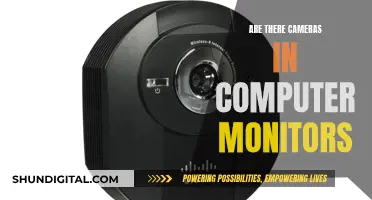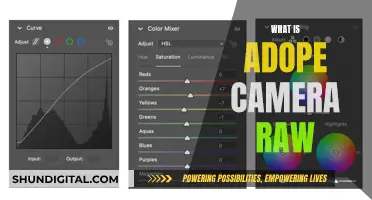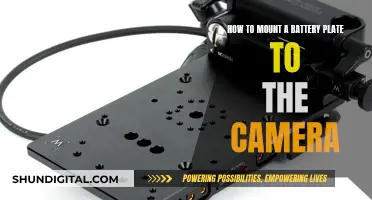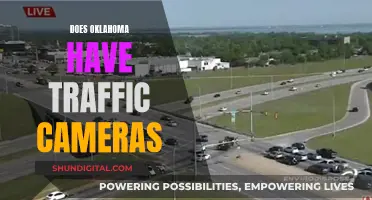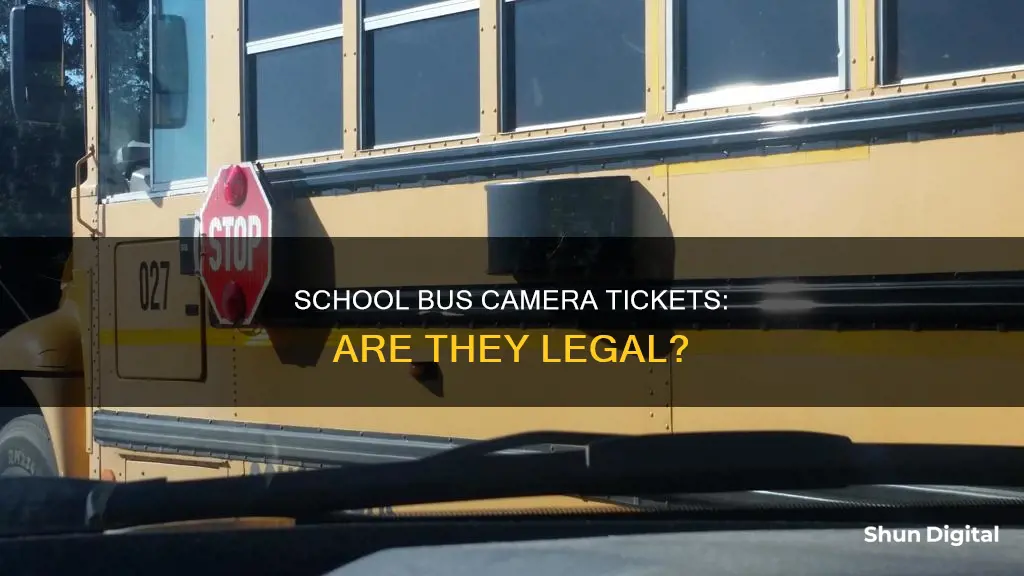
School bus safety has become a growing concern for parents, teachers, and administrators. To address this, some school districts have installed cameras on school buses to capture images of vehicles that pass the bus while it is stopped, with the overhead red lights flashing. The footage from these cameras can then be used to issue tickets to the vehicle owners, typically in the amount of $250. While this method of traffic enforcement has been questioned in the courts, with some judges dismissing tickets due to a lack of proof that the bus was loading or unloading children, it has also gained support from legislators who aim to improve school bus safety and reduce violations. The use of school bus cameras highlights the ongoing efforts to ensure the safe transportation of children to and from school.
| Characteristics | Values |
|---|---|
| Ticket Issuing Process | A reviewer checks the footage from school bus stop-arm cameras before transmitting the video to law enforcement if a violation is observed. The police then send a ticket based on an evidence package that includes video and GPS Telemetry. |
| Ticket Value | $250 |
| Ticket Type | Civil violation, similar to a parking violation. No points are issued against the owner's driver's record. |
| Appeal Process | Drivers can appeal the ticket by reviewing the evidence of their infraction before making an appeal. |
| Camera Activation | Cameras are typically activated when the flashing lights are on and the "stop" bar is extended. |
| Camera Usage | School districts in New York State have installed cameras on more than one in five school buses. BusPatrol America, the largest maker of cameras for school buses in the US, has its products installed on 30,000 school buses in 16 states. |
| Camera Effectiveness | A study of Suffolk County, which introduced the cameras in 2021, showed that stopped-bus violations were reduced by 42% in the three years since. |
What You'll Learn

School bus camera tickets and fines
School bus camera tickets are a civil violation similar to a parking violation. In Montgomery County, Maryland, the registered owner of the vehicle tags receives a $250 fine. In New York, the fine is also $250. These tickets do not affect insurance and are handled by BusPatrol in partnership with the local municipality.
School bus camera tickets are issued when a vehicle passes a stopped school bus. In Montgomery County, this is enforced when the overhead red lights are flashing. In New York, the bus cameras are activated when the flashing lights are on and the "stop" bar is extended. Cameras capture images of any vehicles that pass the stopped school bus, and these images are used as evidence for the ticket.
You can review your school bus camera ticket offense through a secure web portal provided by BusPatrol. The portal shows your offense from up to seven different angles. You can also choose to appeal your ticket by reviewing the evidence of your infraction. The police send an evidence package containing video and GPS Telemetry, which can be accessed through the BusPatrol portal.
The use of school bus cameras has been shown to improve safety for children. Studies show that up to 30,000 violations can happen in a single day in dense urban environments, and the presence of cameras can reduce these violations. In Suffolk County, New York, the introduction of school bus cameras in 2021 reduced stopped-bus violations by 42% over three years.
Charging the Playskool Camera: A Quick Guide
You may want to see also

Evidence packages and appeals
In the case of a $250 ticket issued to a Suffolk County resident, Alfred Croce III, the driver chose to appeal the ticket. Croce, an attorney, argued that the video evidence failed to prove that the vehicle in question was a school bus and that it was stopped to discharge or pick up passengers. The state appeals court sided with Croce, finding that the county had not provided sufficient evidence to prove all elements of the violation. This case set a precedent for similar challenges across the state.
In another instance, a class-action lawsuit was filed against the Town of Hempstead by a group of drivers, including Sergey Kadinsky and Nancy Viti. The lawsuit alleged that the evidence packages, including video recordings, did not prove that the vehicles in question were school buses or that they were stopped for the purpose of discharging or picking up passengers. Kadinsky further argued that the amount of the fine was excessive and that the program was more about generating revenue than ensuring safety. The lawsuit demanded a refund for all tickets issued in Hempstead and modifications to the program. While BusPatrol claimed that the lawsuit lacked merit, it brought attention to the validity of evidence packages and the appeal process for school bus camera-issued tickets.
It is important to note that the laws and procedures surrounding school bus camera tickets may vary by state and local regulations. However, the ability to review evidence packages and appeal tickets is an essential part of the process, allowing drivers to understand the offences and make informed decisions about their next steps.
The Evolution of Fujifilm Cameras: A Manufacturing Journey
You may want to see also

School bus safety and the law
The safety of children travelling to and from school is paramount, and one of the safest ways to transport them is by school bus. However, there is an increasing problem of motorists illegally passing stopped school buses, which puts children at risk of injury or worse. To combat this, many school districts have installed cameras on school buses to capture evidence of motorists breaking the law. This evidence is then used to issue tickets and fines to the offending motorists.
The Problem of Illegally Passing School Buses
It is estimated that as many as 50,000 motorists pass stopped school buses in New York State alone each school day, according to the New York Association for Pupil Transportation (NYAPT). This reckless behaviour endangers the lives of children who are loading or unloading from the bus.
School Bus Camera Evidence
To address the problem of illegal passing, school districts in New York State have installed cameras on more than one in five school buses. These cameras are typically activated when the flashing lights are on and the "stop" bar is extended. They capture images and videos of any vehicles that pass the stopped bus, which can then be used as evidence for issuing a ticket.
Ticketing and Fines
The use of camera evidence for ticketing purposes has been strengthened by recent legislation in New York State. Municipalities can now mail a $250 ticket to the owner of a vehicle captured on camera passing a stopped school bus. This method of enforcement is similar to the use of red-light cameras and is handled by companies like BusPatrol in partnership with local authorities. The ticket is similar to a parking violation, with no impact on insurance or driving records.
Effectiveness of School Bus Cameras
The use of school bus cameras has been shown to be effective in reducing stopped-bus violations. In Suffolk County, New York, the introduction of cameras in 2021 led to a 42% reduction in violations over three years, according to BusPatrol. The company also states that 99.8% of drivers who receive a ticket for passing a school bus do not repeat the offence, making the roads safer for children.
Editing Essentials: Camera Raw CS3 Techniques
You may want to see also

The role of private companies in school bus camera enforcement
Private companies play a significant role in school bus camera enforcement, aiming to improve safety for children and reduce violations. One such company is BusPatrol, which offers a comprehensive solution to address the issue of motorists illegally passing stopped school buses.
BusPatrol's system involves the use of stop-arm cameras installed on school buses that capture footage of vehicles passing the bus illegally. This footage is then reviewed by a designated reviewer from the company, who transmits any violations to law enforcement. The company's technology provides up to seven different angles of the traffic offense, ensuring clear evidence of the infraction.
One of the key advantages of partnering with BusPatrol is their educational approach. They provide drivers with access to a secure web portal where they can review their offenses and learn to drive more safely around school buses. This approach has proven effective, with 99.8% of drivers who receive a ticket for passing a school bus not repeating the offense.
In addition to BusPatrol, other private companies also offer school bus camera systems and related services. For example, American Bus Video Inc. provides a range of camera systems designed for different types of buses, including special needs buses and private charter buses. These systems are equipped with features such as mobile onboard DVRs, video masking capabilities, and encryption to ensure the integrity of video files.
The involvement of private companies in school bus camera enforcement brings several benefits. Firstly, it provides specialized technology and expertise that may not be readily available within government agencies. This includes advanced camera systems, secure data storage, and efficient violation review processes. Secondly, private companies can help alleviate the financial burden on taxpayers by offering their services and technology at no cost to the public.
Furthermore, private companies often have the flexibility to adapt and innovate quickly, allowing them to stay ahead of the curve in terms of technology and best practices. They can also provide additional resources and personnel dedicated to reviewing footage and supporting law enforcement in their efforts to improve road safety around school buses.
The Pinnacle of Camera Quality: Everlasting Legacy
You may want to see also

The impact of school bus cameras on driver behaviour
School bus cameras have been implemented in various places to improve safety and reduce violations. However, their impact on driver behaviour is a complex issue that has been discussed extensively.
On the one hand, school bus cameras are designed to deter drivers from passing stopped school buses, which can put children at risk. Studies have shown that up to 30,000 violations can occur in a single day in dense urban areas, highlighting the importance of enforcing traffic laws. The presence of school bus cameras can act as a deterrent and raise awareness among drivers about the consequences of their actions.
On the other hand, the effectiveness of school bus cameras in changing driver behaviour has been questioned. Some drivers may view the cameras as a nuisance or an invasion of privacy. Additionally, there are concerns about the accuracy and fairness of the ticketing process, as evidenced by the pending class-action lawsuit in Nassau on behalf of drivers who received tickets. The decision from the Appellate Term in a Suffolk County case also highlighted the flaws in the way the program was implemented, requiring proof that the vehicle is a "school bus" and that it was picking up or discharging passengers.
Furthermore, school bus camera programs have faced criticism for their potential to be used as a revenue-generating tool rather than a safety measure. The high cost of tickets, ranging from $200 to $500, can be a significant financial burden, especially if drivers feel they were wrongfully accused. This may lead to a lack of trust in the system and potentially affect driver behaviour in a negative way, as they may become more cautious and distracted while driving.
Overall, the impact of school bus cameras on driver behaviour is multifaceted. While they can serve as a deterrent and raise awareness, there are also concerns about their effectiveness, fairness, and potential negative consequences. It is important for local governments to carefully consider the implementation and regulation of such programs to ensure they truly improve safety without causing undue burden or distraction for drivers.
To promote positive driver behaviour and ensure the effectiveness of school bus camera programs, several strategies can be implemented:
- Improved Communication and Education: Clear and consistent communication about the presence and purpose of school bus cameras can help drivers understand the importance of complying with the law. Educational campaigns can also raise awareness about the potential risks of passing stopped school buses and the consequences of their actions.
- Fair and Transparent Ticketing: Ensuring a fair and transparent ticketing process is crucial. This includes providing comprehensive evidence, such as multiple angles of the violation, and allowing drivers to easily review their offenses. A well-informed and unbiased appeal process can also help address concerns and correct any potential errors.
- Collaborative Approach: Involving stakeholders, including drivers, school administrators, and community members, in the development and evaluation of school bus camera programs can lead to a more effective and accepted implementation. Their input can help identify potential issues and improve the overall design of the program.
- Focus on High-Risk Areas: Analyzing data to identify areas with a high number of violations or safety concerns can help target the placement of school bus cameras more effectively. This allows for a more efficient use of resources and a greater impact on overall safety.
- Regular Review and Adjustment: School bus camera programs should be regularly reviewed and adjusted based on feedback and outcomes. This iterative approach allows for the identification and correction of any issues, ensuring the program remains effective and adaptable to changing needs.
Adobe Camera Raw vs. Lightroom: Key Differences Explained
You may want to see also
Frequently asked questions
You may pay the fine, which is an admission of guilt, or you may request a hearing. The ticket is similar to a parking violation and does not affect your points or insurance.
School bus cameras are activated when the flashing lights are on and the "stop" bar is extended. Cameras capture images of any vehicles that pass the stopped school bus. A reviewer then checks the footage and transmits any violations to law enforcement.
Yes, you can appeal a ticket from a school bus camera. The police send you a ticket based on an evidence package that contains video and GPS telemetry. You can review the evidence of your infraction before making an appeal.


